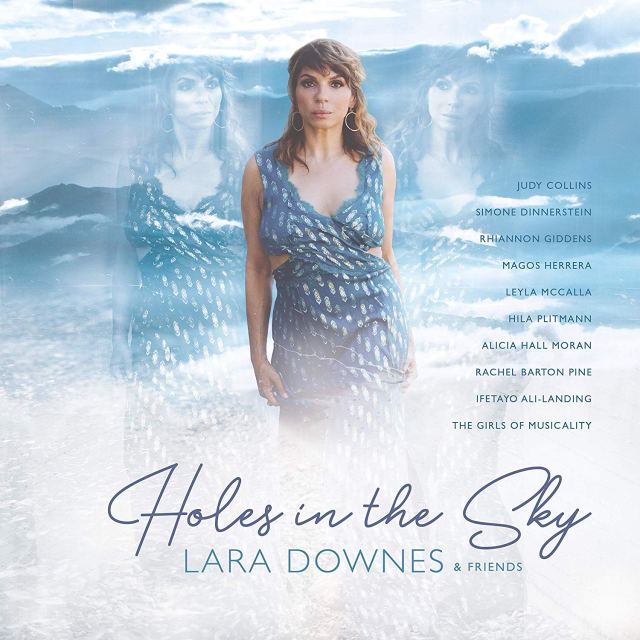
Sony/Portrait
Lara Downes has proven herself as a virtuoso pianist in solo, chamber, and with orchestra. She has demonstrated facility with standard repertoire as well as an intelligent selection of contemporary composers. In this sort of mid-career place she has begun releasing a more personal kind of album of which this is the third incarnation. The “series’ to which I refer is the perception of this reviewer, not one defined as such by Ms. Downes but stick with me. Her previous releases have been organized on one level or another on themes just like most album of any stripe. The difference is a more sociopolitical focus.
One look at the eclectic musical choices here and one sees Downes sharing her spotlight with kindred spirits (composers and performers both) while her themes take on more socially conscious ideas. The first of these was America Again (2016) which is a beautiful collection of short piano pieces predominantly though not exclusively by black composers. It is a very personal choice of repertoire reflecting her profound knowledge of the repertoire as well as the neglect of black composers. The second was Lenny (2018), a tribute to Leonard Bernstein. It includes a marvelously varied group of guest artists and, much as Lenny did, blurs the line between the “classical” and the “vernacular”. It was a love song to a cherished artist (this writer included in the cherishing).
She does something similar here in this album whose title is taken, appropriately enough, from Georgia O’Keefe, “I want real things, live people to take hold of, to see, and talk to, music that makes holes in the sky, I want to love as hard as I can.” In the essay that opens the program booklet Downes speaks briefly of her relationship with women in general and women as composers and as performers.
The album opens with a 1949 piece by Florence Price, a black American composer much of whose whose work has recently been rediscovered and recorded. Her work was also featured on the America Again album. This is a mid-century romantic piece for solo piano.
The second track, and the one that hooked this listener big time is this recording of Judy Collins early song, Albatross (1966) which appeared on her album Wildflowers which in turn provided some of the design elements of the album. The liner notes to the present album also note this connection.
In place of detailed liner notes there is a fascinating conversation between two of the women involved with this album, Lara Downes and Judy Collins. A lovely black and white portrait is included in the liner notes. Their discussion centers primarily on the Albatross song but also touches on the nature of political activism in which Downes laments not being active in marches. Collins tells her (and this writer agrees wholeheartedly) she belongs at the piano. Indeed her activism, though of a gentler nature, gets ideas out most effectively utilizing her incredible talents as a pianist, historian, and fellow musician.
Rather than go through an analysis of each of these pieces I am simply going to provide a track list. It appears that this album is designed to be heard and contemplated as a sonic document first and as a research project at a later time (one hopes for more detail at some point because these are interesting pieces).
1. Memory Mist (1949) by Florence Price
2. Albatross (1967) by Judy Collins
3. A Tale of Living Water (2010) by Clarice Assad
4. Dream Variation with Rhiannon Giddens (1959) by Margaret Bonds and Langston Hughes
5. Ellis Island with Simone Dinnerstein (1981) by Meredith Monk
6. Don’t Explain with Leyla McCalla (1944) by Billie Holiday
7. Willow Weep for Me (1932) by Ann Ronel (arr. by Hyungin Choi)
8. Venus Projection (1990) by Paula Kimper
9. Morning on the Limpopo: Matlou Women (2005) by Paola Prestini
10. Farther from The Heart with Hila Pittman (2016) by Eve Beglarian and Jane Bowles
11. Favorite Color (1965) by Joni Mitchell (arr. by Nora Kroll-Rosenbaum)
12. Noises of Gratitude (2017) by Jennifer Higdon
13. Arroyo, Mi Niña with Mogos Herrera (2018) trad. arr. by Lara Downes
14. Music Pink and Blue (2018) by Elena Ruehr
15. Idyll (1946) by Hazel Scott
16. Blue Piece with Rachel Barton Pine (2010) by Libby Larsen
17. Bloom (2018) by Marika Takeuchi
18. Just for a Thrill with Alicia Hall Moran (1936) by Lil Hardin-Armstrong (arr. by Hyungin Choi)
19. Agwani (Doves) (2009) by Mary Kouyoumdjian
20. What Lips My Lips Have Kissed (2014) by Georgia Stitt
21. Rainbow (n.d.) by Abbey Lincoln and Melba Liston (arr. by Laura Karpman)
22. All the Pretty Little Horses with Ifetayo Ali-Landing and The Girls of Musicality (Trad. arr. by Lara Downes and Laura Karpman)
In these 22 tracks all the music is by women composers and, most charmingly a selection of women performers who appear as sort of cameos on different tracks. The music ranges from the mid-twentieth century to the present and embraces a variety of genres (classical, folk, blues, etc.). The end result is a charming and very intimate document but also one which is somehow gently subversive as it presents the best in musical and performance quality as an acknowledgement of the accomplishments of women in general, (to paraphrase Ms. O’Keefe) making music as hard as they can.